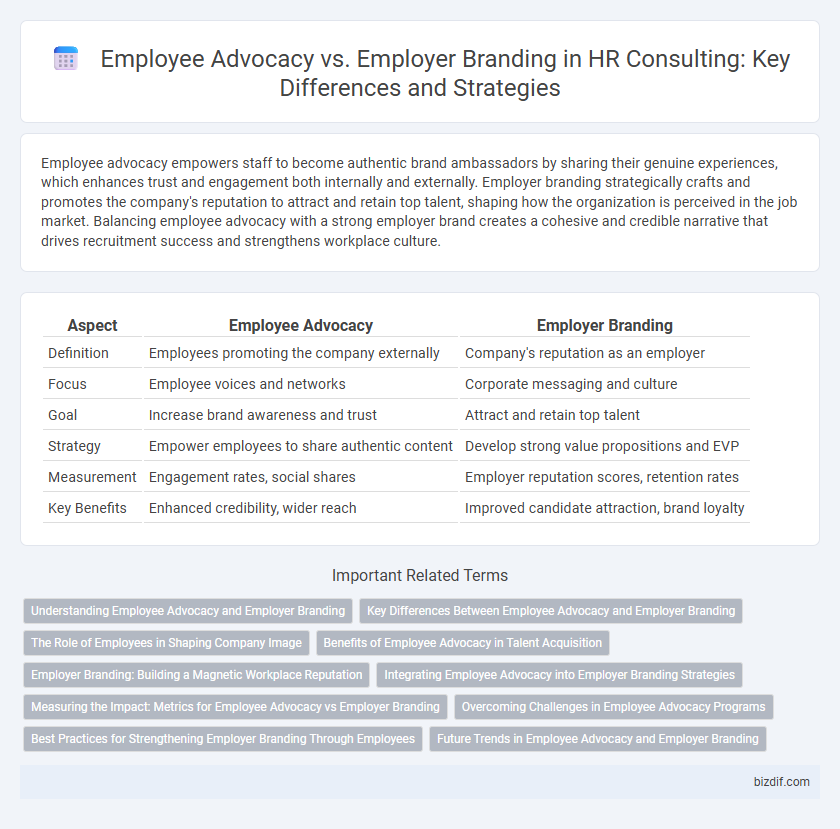Employee advocacy empowers staff to become authentic brand ambassadors by sharing their genuine experiences, which enhances trust and engagement both internally and externally. Employer branding strategically crafts and promotes the company's reputation to attract and retain top talent, shaping how the organization is perceived in the job market. Balancing employee advocacy with a strong employer brand creates a cohesive and credible narrative that drives recruitment success and strengthens workplace culture.
Table of Comparison
| Aspect | Employee Advocacy | Employer Branding |
|---|---|---|
| Definition | Employees promoting the company externally | Company's reputation as an employer |
| Focus | Employee voices and networks | Corporate messaging and culture |
| Goal | Increase brand awareness and trust | Attract and retain top talent |
| Strategy | Empower employees to share authentic content | Develop strong value propositions and EVP |
| Measurement | Engagement rates, social shares | Employer reputation scores, retention rates |
| Key Benefits | Enhanced credibility, wider reach | Improved candidate attraction, brand loyalty |
Understanding Employee Advocacy and Employer Branding
Employee advocacy involves empowering employees to promote the company's values and culture authentically through their personal networks, enhancing trust and engagement. Employer branding focuses on crafting a compelling reputation and identity of the organization to attract and retain top talent. Understanding the synergy between employee advocacy and employer branding helps HR consulting firms develop strategies that align internal enthusiasm with external perception for stronger recruitment and retention outcomes.
Key Differences Between Employee Advocacy and Employer Branding
Employee advocacy leverages employees as authentic brand ambassadors to amplify company values and culture through their personal networks, enhancing trust and reach. Employer branding focuses on crafting and promoting a compelling company image to attract and retain top talent by highlighting benefits, culture, and career opportunities. While employee advocacy is driven by genuine employee experiences, employer branding is a strategic organizational effort to shape external perception.
The Role of Employees in Shaping Company Image
Employee advocacy directly influences employer branding by transforming staff into authentic brand ambassadors who share genuine experiences and insights, enhancing the company's reputation. Engaged employees amplify positive perceptions through social networks, creating trust and credibility that traditional marketing cannot achieve. Organizations investing in employee empowerment and communication see stronger employer branding outcomes, driving talent attraction and retention.
Benefits of Employee Advocacy in Talent Acquisition
Employee advocacy significantly enhances talent acquisition by leveraging authentic employee voices to attract qualified candidates, thereby increasing trust and engagement with the employer brand. Advocates naturally extend the company's reach on social media and professional networks, resulting in higher-quality applicant pools and reduced recruitment costs. This organic promotion also fosters a positive workplace culture that appeals to top talent seeking genuine alignment with company values.
Employer Branding: Building a Magnetic Workplace Reputation
Employer branding shapes a company's reputation as an employer, attracting top talent by highlighting its culture, values, and work environment through targeted campaigns and authentic storytelling. A strong employer brand reduces hiring costs and increases employee retention by fostering loyalty and positive engagement. Leveraging platforms like LinkedIn and Glassdoor enhances visibility and credibility, turning employees into brand ambassadors naturally.
Integrating Employee Advocacy into Employer Branding Strategies
Integrating employee advocacy into employer branding strategies enhances authenticity, leveraging genuine employee voices to strengthen company reputation and attract top talent. Employee advocacy programs encourage staff to share their positive experiences on social media, amplifying brand reach and fostering trust among potential candidates. Incorporating these advocacy efforts into employer branding creates a cohesive message that highlights company culture and employee satisfaction effectively.
Measuring the Impact: Metrics for Employee Advocacy vs Employer Branding
Measuring the impact of employee advocacy involves tracking metrics such as employee engagement rates, the number of employee-generated content shares, and social media reach driven by staff. Employer branding effectiveness is commonly assessed through brand awareness surveys, candidate quality and quantity, and employee retention rates. Data-driven insights from these metrics enable HR consulting firms to tailor strategies that enhance both authentic employee advocacy and strategic employer branding.
Overcoming Challenges in Employee Advocacy Programs
Overcoming challenges in employee advocacy programs requires addressing employee engagement barriers and fostering authentic communication to ensure genuine brand representation. Implementing clear guidelines and providing continuous training equips employees with the tools needed to share brand messages confidently and consistently. Measuring program effectiveness through analytics helps identify areas of improvement, ensuring alignment with employer branding goals while maximizing advocacy impact.
Best Practices for Strengthening Employer Branding Through Employees
Empowering employees as brand ambassadors fosters authentic employer branding by encouraging genuine storytelling and positive workplace experiences. Implementing structured advocacy programs with clear communication channels and recognition incentives enhances engagement while amplifying the company's core values. Regular training and feedback loops ensure alignment between employee narratives and organizational branding strategies, strengthening trust and attracting top talent.
Future Trends in Employee Advocacy and Employer Branding
Emerging trends in employee advocacy emphasize leveraging authentic employee voices through social media platforms to enhance brand credibility and attract top talent. Employer branding is increasingly integrating AI-driven analytics to personalize candidate experiences and predict workforce needs. Both strategies prioritize transparency, employee engagement, and data-driven insights to build resilient, future-ready organizational cultures.
employee advocacy vs employer branding Infographic

 bizdif.com
bizdif.com